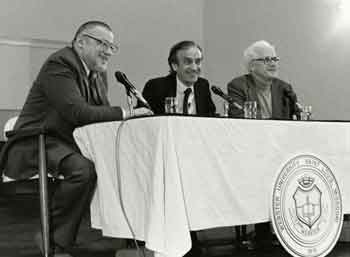
 |

HolocaustBrown became a close friend of Elie Wiesel during a visit to Stanford in 1974. He was appointed to the Presidential Commission on the Holocaust by President Jimmy Carter in 1978 and later became a member of the U.S. Holocaust Memorial Council. Wiesel was chairman of the Council. Brown increasingly considered resigning his membership in 1985 over a number of issues (basically "eroding the right of dissent"). He and other members of the Council were very upset by President Ronald Reagan's visit to Germany where he visited the Bitburg cemetery, which included SS (Schutzstaffe) soldiers who had staffed the concentration camps. While no members ultimately resigned the Council, they all debated how to confront Reagan's action. Ultimately, they decided not to all resign at once, fearing this would jeopardize the mission of the museum. Only Wiesel was renominated by Reagan to the Council for another three year term. Wiesel later resigned. Below is Brown's proposal. Comments at Emergency Meeting of U.S. Holocaust Memorial Council, May 13, 1985Each of us has to act from conscience, Mr. Chairman, and to state my own position of conscience is not to question the integrity of another's conscience. I stress the point since my own position will put me at odds with people in this room whose convictions I admire and whose friendship I cherish. I support the resolution calling for the collective resignation by the Council. I have been shocked by the insensitivity of the president in recent weeks to everything for which the Council stands. Recall that series of events: We assert the absolute necessity of remembering the past; the president, when the German trip is first under discussion, insists that there should be no trip to Dachau, telling us that we must forget the past and look to the future. See full comments.
Photo: Harry James Cargas, Elie Wiesel and Brown at Webster University, St. Louis, circa 1980. Cargas, like Brown, was a member of the U.S. Holocaust Memorial Council. |